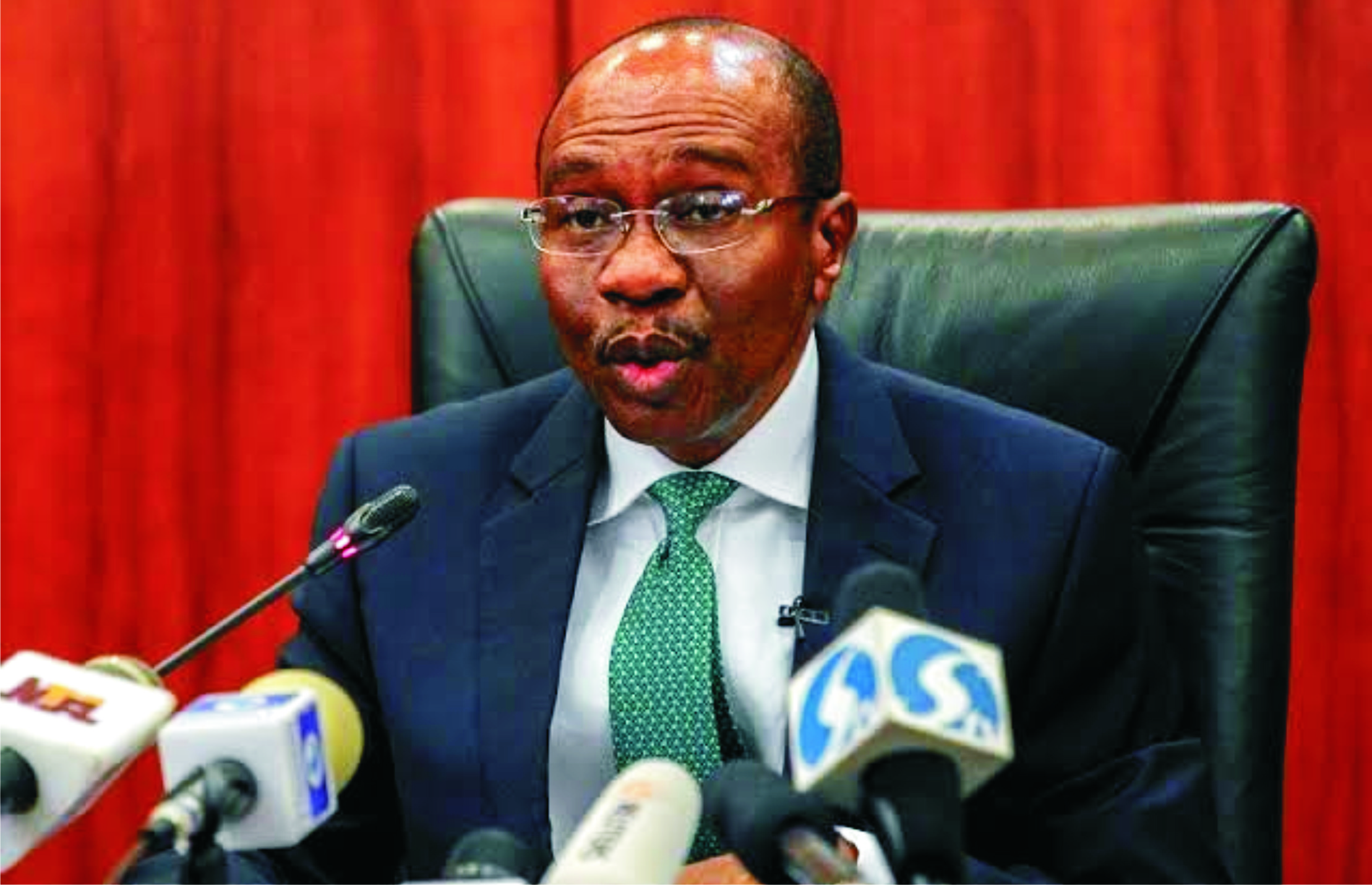Business
Excessive Borrowing From CBN Threatens Exchange Rate, Others – Report

Excessive and continuous borrowing from the Central Bank of Nigeria (CBN), by the Federal Government through the Means and Ways Advances window can have adverse effects on the apex bank’s monetary policy, and subsequently harm domestic prices and exchange rates.
This was disclosed in the recent monetary policy category of the CBN’s Frequently Asked Questions page.
Under the sub-section, titled ‘Can the Federal Government frustrate the Central Bank of Nigerian from pursuing its monetary policy?’, it was stated that there were certain distortions or surges in the monetary base due to the CBN’s financing deficits.
“Yes, when the Federal Government exceeds its revenue, the CBN finance government deficit through Ways and Means Advances subject (in some cases) to the limits set in the existing regulations, which are sometimes disregarded by the Federal Government.
“The direct consequences of the central bank’s financing of deficits are distortions or surges in monetary base, leading to adverse effect on domestic prices and exchange rates, i.e macroeconomic instability, because of excess liquidity that has been injected into the economy”, the response report explains.
Ways and Means Advances is a loan facility by the apex bank to finance the government during temporary budget shortfalls subject to limits imposed by law.
The Federal Government’s rising borrowing from the CBN has been a source of concern to economic experts and stakeholders.
A global credit rating agency, Fitch Ratings, had in January 2021 raised concerns over the Federal Government’s repeated recourse to its Ways and Means facility with the CBN.
It criticised the CBN for allowing the Federal Government’s borrowing to exceed the five per cent limit.
“The CBN’s guidelines limit the amount available to the government under its Ways and Means Facility to five per cent of the previous year’s fiscal revenues.
“However, the FGN’s new borrowing from the CBN has repeatedly exceeded that limit in recent years, and reached around 80 per cent of the FGN’s 2019 revenues in 2020,” it said.
The agency said that the use of central bank financing in Nigeria could raise pose macro-stability risks in the context of weak institutional safeguards that preserve the credibility of policymaking and the ability of the central bank to control inflation.
Although Fitch Ratings said it expected the Nigerian government to reduce its use of the CBN facility, it remains unclear whether the apex bank would cut down on its continued financing of the government’s deficit.
The N15.51tn owed the CBN by the Federal Government is not part of the country’s total public debt stock, which stood at N38tn as of September 2021.
In the first six months of 2021, the Federal Government borrowed N2.4tn from the CBN, more than half of what it got in 2020.
Business
Over $1.5bn Spent To Protect Nigeria’s Oil Installations -FG

The Federal Government has said it has spent over $1.5 billion from 2020 to date to protect the nation’s oil installations and curb crude oil theft.
The Secretary to the Government of the Federation (SGF), George Akume, made this known, yesterday, at a public hearing of the House of Representatives on crude oil theft.
Akume was represented by the Permanent Secretary, General Services, Maurice Nandi.
The Federal Government was concerned about the report from the Nigerian Extractive Industries Transparency Initiative (NEITI), which pointed to over $46 billion worth of stolen crude between 2009 and 2020.
“The House had set up a special committee, headed by the Chairman of the House Committee on Petroleum Upstream, Ado Doguwa, to investigate the losses in the oil and gas sector,” Akume said.
Additionally, Speaker of the House Tajudeen Abbas, represented by Deputy Speaker Benjamin Kalu, said $10 billion has been lost in seven months to crude oil theft.
Business
FG Unveils Metering Project Teams To Combat Oil Theft

The Nigerian Upstream Petroleum Regulatory Commission (NUPRC) has inaugurated Metering Audit and Advance Cargo Declaration project teams, to promote transparency and accountability in the upstream oil and gas.
The Commission’s Chief Executive, Mr Gbenga Komolafe, who spoke at the inauguration of the project teams, on Wednesday in Abuja, said the projects were designed to combat crude oil theft and boost revenue.
It will be recalled that the Federal Executive Council (FEC) had approved a 21 million dollars contract to audit metering and measurement equipment in the 187 oil flow stations in the country and also put in place an advance cargo declaration solution.
These initiatives as earlier announced by Minister of State for Petroleum Resources Sen. Heineken Lokpobiri, aims at enhancing monitoring and accountability in crude oil production and distribution, addressing rampant oil theft.
Komolafe, while inaugurating the project monitoring teams, announced a four-month deadline for the completion of the projects.
According to him, the initiatives zre in line with NUPRC’s mandate to ensure optimal government revenues from upstream petroleum operations, as specified in the Petroleum Industry Act (PIA) 2021.
He said the projects would be executed by PE Energy Limited and P-Lyne Energy.
“Audit of Upstream Measurement Equipment and Facilities project aims to establish reliable baseline data for all measurement points, identify gaps in production and allocation measurement, and implement targeted interventions to enhance metering infrastructure.
“This project is crucial in addressing issues such as the presence of obsolete equipment, lack of a comprehensive database and absence of real-time production measurement across many locations.
“Advance Cargo Declaration Solution complements the metering audit by establishing a robust system for declaring and tracking crude oil transportation and exports from Nigeria,” he said.
He said the project would monitor and account for the movement of crude oil within the country, prevent disruptions, theft, and under-declaration, and ensure that only certified products were being exported.
“It will also enable real-time tracking, reconciliation, and reporting of crude oil exports to facilitate accurate revenue billing and generation.
“For a long time as a nation we have suffered from the menace of crude oil theft and there have been contentions on the accuracy in terms of our hydrocarbon accounting in Nigeria in a manner that has impacted our federal revenue unfavourably.
“So what has happened is that the commission, within its assumption of office, has been able, as a regulator, to take a very bold measure to address this issue.
“We have 31 crude oil loading terminals. So we are trying to ensure that we put in place a framework where the nation will be able to accurately determine and measure the volume of crude that is loaded from these terminals,” he said.
He tasked the teams, comprising experts from various NUPRC’s departments, to discharge their duties professionally, adding that the projects would be delivered within four months, while any request for timeline extension would not be entertained.
The NURPC boss said that each project had a dedicated team, led by Mr Enorense Amadasu, Executive Commissioner for Development and Production, NURPC, with strict timelines for completion.
While commending President Bola Tinubu for his support, Komolafe urged stakeholders to cooperate with the teams to facilitate successful implementation of the projects.
“Team for Audit of Upstream Measurement Equipment and Facilities in the Nigerian Oil and Gas Industry” project comprise ; Manuel Ibituroko – Deputy Director, Facilities Engineering & Optimisation; Mohammed Sirajo – Manager, Facilities Engineering; Ike Chidi – Manager, Facilities Engineering; and Bashir Shariff – Principal Regulatory Officer.
“Team for Advance Cargo Declaration Solution” project, comprise: Bello Shehu – Assistant Director, Crude Oil & Gas terminal Operations; Abdulrahman Idris – Manager, Petroleum Accounting; Omeje Desmond – Deputy Manager, COTO PHC; Dimkpa I. H. – PRO, COTO Warri and Olatunji Babatunde – NDR”.
He said the teams would liaise with the contractors to ensure the fulfilment of the Commission’s specified obligations and monitoring the implementation of the projects to ensure alignment with the scope and specifications.
Responding, one of the two contractors, Chief Executive Officer, PE Energy Ltd, Daere Akobo, thanked the Federal Government for the confidence repose in them to take a pragmatic look at hydrocarbon accounting.
Also, the Director, P-Lyne Energy, Tomi Ogunwole assured that the company would abide by the four-month deadline set by the commission.
Business
FG Launches Blueprint For Africa’s Digital Trade
The Federal Government of Nigeria has launched a comprehensive strategy to spearhead Africa’s digital trade revolution, aligning with the African Continental Free Trade Agreement (AfCFTA) framework.
The initiative, a key component of President Bola Tinubu’s Renewed Hope Agenda, is aimed at leveraging trade as a driver of economic growth and continental unity in accordance with AfCFTA’s objectives.
According to Vice President Kashim Shettima, in his X handle (formerly twitter), “Nigeria is in a unique position to spearhead the continent’s technological transformation”.
He said the strategy includes implementing AfCFTA’s Digital Trade Protocol, developing technical talent hubs, enhancing digital infrastructure investments, and promoting innovation and entrepreneurship.
Shettima stated this while delivering a keynote address during a stakeholders’ summit with the theme, “Digital Trade in Africa: The Renewed Hope Strategy”, at the Presidential Villa, Abuja.
The Vice President emphasised the need for public-private sector synergy and assured continued government investment in digital infrastructure and human capital development.
On his part, the Minister of Communications, Innovation, and Digital Economy, Bosun Tijjani, highlighted the Tinubu administration’s substantial investments in all aspects of the digital trade protocol, aiming at harnessing opportunities both in Nigeria and across the continent.
He stated that innovative policies and programmes, such as the Three Million Technical Talent programme, the data protection policy, and increased investments in digital infrastructure, were equipping Nigeria’s young population for current and future opportunities.
Tijjani stressed the critical role of technology in facilitating trade across Africa, noting that the unprecedented opportunities within the single market area could be best leveraged through effective collaboration and networking enabled by digital technology.
-
News3 days ago
FG Appeals To Youths To Shelve Protest
-
Health3 days ago
Who Unveils Plans To Check HIV/AIDS Discrimination
-
Sports1 day ago
Amapakabo Returns To Abia Warriors As Head Coach
-
Politics1 day ago
Approach Nationwide Protesters With Civility, Ezekwesili Urges FG
-
Business3 days ago
‘Digital Platform, Key To Entrepreneur Success’
-
Niger Delta3 days ago
Delta Assembly Passes Urban, Regional Planning Bill
-
News1 day ago
#EndBadGovernance: Arewa, Yoruba Youths Opt Out
-
Niger Delta1 day ago
Okpebholo: Edo Denies Plan To Cause Crisis On Suspects’ Arrest

